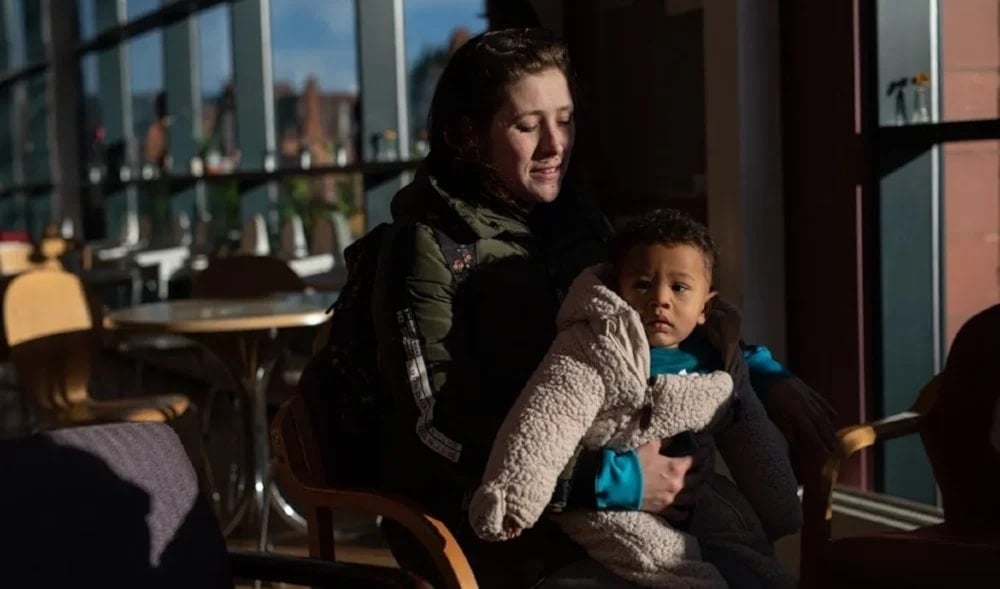UNICEF: child poverty in England is undermining early development
According to The Guardian, UNICEF warns that children in England’s poorest areas face worse health and development outcomes, urging an end to the two-child benefit cap.
-

A customer of the Coventry Foodbank center in Queens Road Baptist Church sits with her one-year-old son before collecting her food parcel in Coventry, UK, in this undated photo. (AFP)
Children living in England’s most deprived areas are significantly less likely to reach key early development milestones by age five, according to a new report by UNICEF UK reviewed by The Guardian.
The aid agency is calling for immediate policy action, including the removal of the two-child benefit cap, to address what it describes as a deepening crisis in early childhood development across the country.
The report mapped local authority data across England, measuring deprivation alongside health and education outcomes such as oral health, weight, and emergency care usage.
The findings paint a stark picture of inequality, with UK children in the poorest areas more than twice as far from meeting the government’s benchmark of 75% of preschoolers achieving a “good level of development,” compared to those in the wealthiest communities, according to The Guardian.
According to Unicef UK’s analysis, the five most deprived local authorities, Blackpool, Knowsley, Liverpool, Kingston upon Hull, and Middlesbrough, ranked in the bottom 20% across five of the six child wellbeing indicators assessed in the UK. These include developmental progress, weight status, and healthcare access.
According to The Guardian, the charity emphasized that without immediate intervention, children in these areas are likely to face long-term setbacks. “Growing up in poverty damages children’s life chances,” said Philip Goodwin, CEO of Unicef UK.
“It is not acceptable that children in deprived areas are more likely to be behind at school, overweight or obese, suffering from untreated tooth decay, and visiting A&E more frequently, all before their fifth birthday.”
Health inequality in children tied to poverty levels
The report revealed that reception-aged children in the most deprived regions of England are more than twice as likely to suffer from obesity (12.9%) than those in affluent areas (6%).
Meanwhile, nearly one-third (29%) of children in these communities have untreated tooth decay, compared with 15% in the wealthiest areas. Additionally, young children in deprived localities visit A&E 55% more often than their peers, according to The Guardian.
These outcomes, UNICEF warned, reflect growing health inequality in children, which is directly linked to rising child poverty. The organisation stressed that failing to act now will create an unhealthy generation of adults burdened by preventable conditions.
UNICEF and public health leaders urge urgent action
UNICEF UK has called on the government to lift the two-child benefit cap and increase investment in early childhood health and education services. Without decisive intervention, it warned, hundreds of thousands of children will continue to suffer the consequences of systemic neglect.
As reported by The Guardian, “there must be immediate, decisive, and ambitious action by the government,” Goodwin said. “The government must act urgently to lift the two-child limit and the benefit cap and commit to investing in the vital health and education services that support children during their crucial early years.”
Echoing these concerns, Sarah Woolnough, chief executive of the King’s Fund, warned of long-term repercussions. “Today’s report is a stark reminder that as child poverty rises in many parts of the country, children’s health is spiralling downwards,” she said.
“Lifelong health issues are established in childhood. If the government wants to create ‘the healthiest generation of children ever,’ tackling deprivation must be a top priority,” as reported by The Guardian.
UK Prime Minister Keir Starmer addressed the issue in parliament last week, stating he was “absolutely determined” to “drive down” child poverty in the UK, as anticipation grows over the government’s upcoming strategy on the matter.
Meanwhile, according to The Guardian, a government spokesperson defended current efforts, pointing to the creation of a dedicated taskforce and recent policies aimed at reducing inequality. “We have introduced free breakfast clubs, increased pupil premium funding, and expanded plans for free school meals to all children in households on Universal Credit,” the spokesperson said.
Despite these measures, experts and campaigners argue they fall short of what is needed to reverse the impacts of child poverty in England and close the widening gap in early childhood development.

 4 Min Read
4 Min Read








